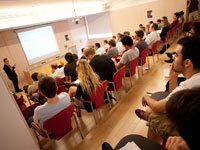research
Prof. Pol Antràs (Harvard): In global sourcing the aggregate gains seem to outweigh the losses

Prof. Pol Antràs (Harvard University), now BSE Board Member and alumnus of the Master in Economics, delivered a series of three lectures on Contracts and the Global Organization of Production at the Center for Research in International Economics (CREI), one of the School's academic units, from June 20-22, 2012.
The lecture series marks the third edition of the CREI Lectures in Macroeconomics, celebrated every two years with support from Princeton University Press. The lectures are given by a “young senior scholar" who has recently made a major, focused contribution to macroeconomics or international economics.
Prof. Antràs has established himself as a Professor of Economics at Harvard and a Research Associate at the National Bureau of Economic Research (NBER), where he served as Director of the International Trade and Organization (ITO) Working Group. Before earning his PhD at the Massachusetts Institute of Technology (MIT), he graduated from the UPF Master in Economics, now organized by the BSE.
The three lectures delivered by Prof. Antràs this year summarized and extended recent work exploring the role of contractual frictions in shaping the international organization of production, as well as the implications of these frictions for the workings of the world economy. The lectures blended theory and empirics and also pointed out implications for policy.
In a brief interview following the lectures, Prof. Antràs offered some reflections on the main ideas of the talks and a bit of advice to aspiring academics.
Interview with Prof. Pol Antràs (Harvard University), Master in Economics Class of 1999
You started off your first lecture by saying that that you are "not much of a macroeconomist," yet your research has important implications for the world economy. Can you explain a bit about the macroeconomic implications of your work on contractual aspects of the international organization of production?
I guess you are right: I am not a Macroeconomist in the narrow sense of the word, but my work is of relevance to Macroeconomics. The way that the gains from economic integration are shared across countries are crucially shaped by the contractual interactions between producers in the world economy. This relates to issues of bargaining power in particular contracts, but also to the broader impact of integration on labor markets when labor demand by foreign companies is affected by the facility with which they can contract with foreign workers.
Why do you see internationalization as a "double-edged sword"?
Because although it tends to partly protect the integrating party from the vagaries of international contracting, it often tends to dilute the incentives of workers and managers in the integrated party.
Is the net result of "global sourcing" positive or negative for the world economy?
Available evidence suggests that the aggregate gains outweigh the losses, although it is also obvious that global sourcing creates winners and losers, so it is no surprise that some people have a negative view of it.
CREI Macro lectures are given by "young senior scholars." Can you offer any advice to masters students at the BSE who aspire to follow the academic career path as you have?
Aim high and work hard.

Prof. Pol Antràs (Harvard University) delivers lectures on "Contracts and the Global Organization of Production."

The lecture series marks the third edition of the CREI Lectures in Macroeconomics.

